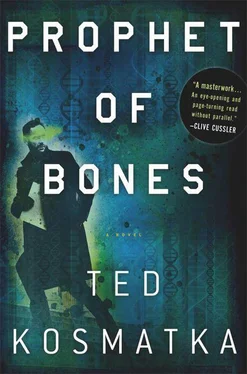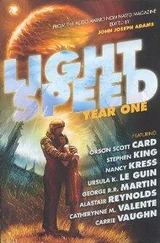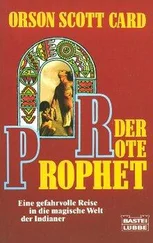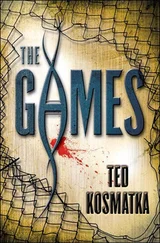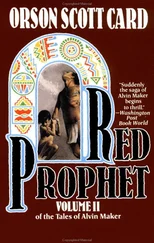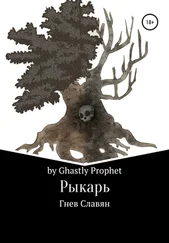“I’ve got a secret for you,” Babyface said. “God hates His prophets. Always has.”
“God cannot hate.”
“That’s blasphemy,” the blond man said. He lifted the gun to Manuel’s face. “God is capable of all things.”
He pulled the trigger.
Paul liked playing God in the attic above his family garage.
That’s what his father called it, playing God, the day he found out. That’s what he called it the day he smashed it all down.
Paul built the cages out of discarded two-by-fours he’d found under the deck and quarter-inch mesh he bought from the local hardware store. He gathered small scraps of carpet, odds and ends of plywood, a bent metal bracket that used to belong to his mother’s old sewing machine table.
Paul drew the plans out carefully on graph paper during the last week of school.
Two weeks into summer break, his father left town to speak at a scientific conference. “Be good while I’m gone,” his father warned him as they stood in the foyer. “Keep studying your verses.”
“I will.”
Paul watched from the window as the long black car backed down the driveway.
Because he wasn’t old enough to use his father’s power tools, he had to use a handsaw to cut the wood for the cages. He used his mother’s sturdy black scissors to snip the wire mesh. He borrowed hinges from old cabinet doors, and nails from the rusty coffee can that hung over his father’s unused workbench.
That evening his mother heard the hammering and came out to the garage.
“What are you doing up there?” She spoke in careful English, peering up at the rectangle of light that spilled down from the attic.
Paul stuck his head through the opening, all spiky black hair and sawdust. “Nothing.”
“You’re doing something; I can hear you.”
“I’m just playing around with some tools,” he said. Which was, in some sense, true. He couldn’t lie to his mother. Not directly.
“Which tools?”
“Just a hammer and some nails.”
She stared up at him, her delicate face a broken Chinese doll—pieces of porcelain reglued subtly out of alignment.
“Be careful,” she said, and he understood that she was talking both about the tools and about his father.
* * *
The days turned into weeks as Paul worked on the cages. The summer wore on, Lake Michigan humidity cloaking the region like a veil. Because the wood was big, he built the cages big—less cutting that way. The cages were enormous, overengineered structures, ridiculously outsized for the animals they’d be holding. They weren’t mouse cages so much as mouse cities—huge tabletop-sized enclosures that could have housed border collies. He spent most of his paper-route money on the project, buying odds and ends he needed: sheets of Plexiglas, plastic water bottles, and small dowels of wood he used for door latches. While the other children in the neighborhood played basketball or wittedandu , Paul worked on his project.
He bought tiny exercise wheels and cedar chip bedding. He pictured in his head how it would be once he finished: a mouse metropolis. Rodent utopia. The mice themselves he bought from a pet store near his paper route. Most were white feeder mice used for snakes, but a couple were of the more colorful, fancy variety. And there were even a few English mice—sleek, long-bodied show mice with big tulip ears and glossy coats that felt slick under his fingers. He wanted a diverse population, so he was careful to buy different kinds.
The woman at the pet store always smiled at him when he came in. She was in her sixties, with bright, bottle-red hair and a pleasant, chubby face. A bell above the door would ring as he stepped inside the shop, and then he’d walk to the back, bend low, and stare through the glass at all the mice for sale. He’d tap his finger on the glass. “That one,” he’d say. “And that one over there—the brown one in the corner grooming itself.”
“Those are good ones,” she always said, no matter which mice he picked. “Those are good ones.”
Then the woman would pop the lid and reach inside the cage while the mice ran in berserk little circles to avoid being caught. Catching the mice wasn’t easy. Paul understood their fear. For most of them, when that hand came down, it meant death. It meant they were about to join the food chain. He wondered if they sensed this, if they sensed anything at all. He wondered if they thought the hand was the hand of God.
“It’s okay,” he whispered to them, willing them to be still. “Not this time.”
The woman put the mice in little cardboard travel boxes so he could carry them home in his paper-route bag. Later in the evening, when no one was watching, he snuck them up to the attic.
While he worked on their permanent homes, he kept his mice in little glass aquariums stacked on a table in the middle of the room. He fed them scraps of food he stole from the dinner table—chunks of buttered bread, green beans, and Ritz crackers. During the last weeks of summer break, Paul stood back and surveyed all he’d created. It was good. The finished cages were huge, beautiful habitats. He’d heard that word, “habitats,” when doing research about zoos. Paul understood that his cages weren’t natural habitats; they didn’t have plants and rocks inside them. But Mus musculus wasn’t a natural animal, not really. Maybe for a mouse, a habitat didn’t have to look like nature. Maybe it looked like this.
In the attic, Paul opened the lids on the aquariums and released his mice into their new enclosures one by one. The mice advanced cautiously, sniffing the air—the first explorers on a new continent.
That afternoon, to mark the occasion, he set out on his bike to the local grocery store, where he bought a head of lettuce as a treat for the mice. He brought along his pad of graph paper, stuffed into his paper-route bag, and on the way back stopped at a park a few blocks from his house. The late afternoon sun slanted through the trees. The park was mostly empty. A few older kids hung out on the bleachers near the tennis courts. Kids his own age played near the swings.
Paul looked down at his graph paper and studied his designs. Already he could see ways in which the habitats might be improved. He put pencil to paper, bent over his work, and so didn’t hear the footsteps behind him.
“What you doing?” The voice came from directly behind him.
Paul turned. It was Josh, a kid from his school, two grades older.
“I said, what you got there?”
“Nothing,” Paul said. He knew Josh well. Knew his tactics from the school yard, all smiles and friendly until it turned bad.
“Doesn’t look like nothing to me. Let’s see.”
Josh grabbed for the notebook and Paul jerked it away.
“Leave me alone.”
The older boy slammed the pad out of Paul’s hand and then kicked it, scattering the pages across the ground. He laughed. “I didn’t really want to see it anyway,” he said, and walked off.
Paul bent to pick up his drawings. The pad had split apart, and the papers were drifting away in the wind. On the bleachers, one of the older kids cackled. Paul had nearly gathered the last of his drawings when a sudden gust carried the final sheet toward the swings.
A narrow, sandaled foot came down on the paper, catching it.
“That guy is such a jerk,” came a female voice.
Paul looked up from the sandal. A girl from the neighborhood. He’d seen her around but had never spoken to her. She didn’t go to his school. He could tell by her long hair and dress that she went to Nearhaven. You could almost always tell Nearhaven kids that way. Just as they could tell the pubbies. And there beside her, on the swing, was a small boy. She bent, picked up the paper, and handed it to Paul.
Читать дальше
